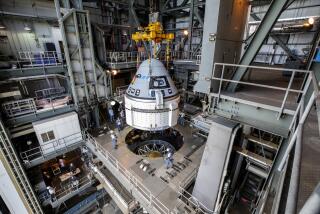Air Force Sends Experts to Look at C-17 Wings
- Share via
The Air Force has dispatched a high-level team of experts to McDonnell Douglas in Long Beach to determine whether the firm’s C-17 cargo jet has a serious defect in its wings, sources close to the program said Sunday.
Air Force experts from Wright Laboratories in Dayton, Ohio, are trying to determine whether the C-17’s failure in a ground test Thursday indicates a serious defect that will require a major redesign, said the sources, who asked not to be named.
During the test the C-17’s wings buckled about 20% short of their required strength. The wings are supposed to withstand 150% of their projected flight loads, but they buckled at 130%.
The Air Force is “looking at this with concern,” worrying that the wing problem could be the most serious setback yet for the trouble-plagued aircraft. At a minimum, McDonnell will have to repair the wing that buckled and conduct the test again, a time-consuming task whose cost is “not trivial,” the sources said.
Earlier in the program, the aircraft’s horizontal stabilizer buckled well short of its required margin in a test. The stabilizer was reinforced with several pounds of metal, however, and proved to be an insignificant problem.
But the wing is a much larger and more critical structure. Reinforcing the wing could add substantial weight to the C-17, whose wings already exceed the original weight specifications, according to sources. They said McDonnell has produced 16 sets of wings that might have to be modified.
The fact that both wings buckled at the same point in the test means that the problem was not a manufacturing defect, but either a design error or a mistake in the test procedure, the sources said.
One possibility is that the wing actually bore the required 150% load and that the test itself was flawed. Air Force investigators have apparently found a Navy engineering study that backs up this theory.
Some securities analysts are deeply concerned over the latest bad news, questioning whether Congress would tolerate a major redesign and whether McDonnell could afford one under its fixed-price contract. The Air Force plans to buy 120 C-17s at an estimated cost of $40 billion, but the program is already about $1 billion over budget and a year behind schedule.
McDonnell Chief Financial Officer Herbert Lanise tried to soothe analysts Friday but acknowledged in a conference call that the company did not know how serious the problem is, said an analyst who asked not to be named.
Lanise also told the analysts that the company expects to report third-quarter earnings of $2.65 to $2.70 a share, an improvement over Wall Street estimates that average about $1.70 per share. But that figure presumably would not include any write-off of expenses required as a result of the C-17 wing problem.
More to Read
Inside the business of entertainment
The Wide Shot brings you news, analysis and insights on everything from streaming wars to production — and what it all means for the future.
You may occasionally receive promotional content from the Los Angeles Times.










